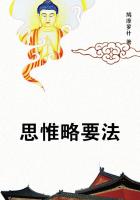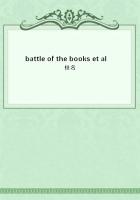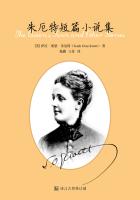"The crawling glaciers pierce me with the spears of their moon-freezing crystals, the bright chains Eat with their burning cold into my bones."Mercury, Jupiter's messenger, is sent to offer him freedom if he will repent and submit to the tyrant.On his refusal, the Furies are let loose to torture him, and his agony takes the form of a vision of all the suffering of the world.The agony passes, and Mother Earth calls up spirits to soothe him with images of delight; but he declares "most vain all hope but love," and thinks of Asia, his wife in happier days.The second act is full of the dreams of Asia.With Panthea, one of the ocean nymphs that watch over Prometheus, she makes her way to the cave of Demogorgon, "that terrific gloom," who seems meant to typify the Primal Power of the World.Hence they are snatched away by the Spirit of the Hour at which Jove will fall, and the coming of change pulsates through the excitement of those matchless songs that begin:
"Life of life! thy lips enkindle With their love the breath between them."In the third act the tyrant is triumphing in heaven, when the car of the Hour arrives; Demogorgon descends from it, and hurls him to the abyss.Prometheus, set free by Hercules, is united again to Asia.And now, with the tyranny of wrongful power,'The loathsome mark has fallen, the mall remains Sceptreless, free, uncircumscribed, but man Equal, unclassed, tribeless, and nationless, Exempt from awe, worship, degree, the king Over himself; just, gentle, wise."The fourth act is an epilogue in which, to quote Mrs.Shelley again, "the poet gives further scope to his imagination....
Maternal Earth, the mighty parent, is superseded by the Spirit of the Earth, the guide of our planet through the realms of sky; while his fair and weaker companion and attendant, the Spirit of the Moon, receives bliss from the annihilation of evil in the superior sphere." We are in a strange metaphysical region, an interstellar space of incredibly rarefied fire and light, the true home of Shelley's spirit, where the circling spheres sing to one another in wave upon wave of lyrical rapture, as inexpressible in prose as music, and culminating in the cry:
"To suffer woes which Hope thinks infinite;To forgive wrongs darker than death or night;To defy Power which seems omnipotent;
To love, and bear; to hope till Hope creates From its own wreck the thing it contemplates;Neither to change, nor falter, nor repent;This, like thy glory, Titan, is to be Good, great and joyous, beautiful and free;This is alone Life, Joy, Empire and Victory."On the whole, Prometheus has been over-praised, perhaps because the beauty of the interspersed songs has dazzled the critics.
Not only are the personages too transparently allegorical, but the allegory is insipid; especially tactless is the treatment of the marriage between Prometheus, the Spirit of Humanity, and Asia, the Spirit of Nature, as a romantic love affair.When, in the last of his more important poems, Shelley returned to the struggle between the good and evil principles, it was in a different Spirit.The short drama of 'Hellas' (1821) was "a mere improvise," the boiling over of his sympathy with the Greeks, who were in revolt against the Turks.He wove into it, with all possible heightening of poetic imagery, the chief events of the period of revolution through which southern Europe was then passing, so that it differs from the Prometheus in having historical facts as ostensible subject.Through it reverberates the dissolution of kingdoms in feats of arms by land and sea from Persia to Morocco, and these cataclysms, though suggestive of something that transcends any human warfare, are yet not completely pinnacled in "the intense inane." But this is not the only merit of "Hellas;' its poetry is purer than that of the earlier work, because Shelley no longer takes sides so violently.He has lost the cruder optimism of the 'Prometheus', and is thrown back for consolation upon something that moves us more than any prospect of a heaven realised on earth by abolishing kings and priests.
When the chorus of captive Greek women, who provide the lyrical setting, sing round the couch of the sleeping sultan, we are aware of an ineffable hope at the heart of their strain of melancholy pity; and so again when their burthen becomes the transience of all things human.The sultan, too, feels that Islam is doomed, and, as messenger after messenger announces the success of the rebels, his fatalism expresses itself as the growing perception that all this blood and all these tears are but phantoms that come and go, bubbles on the sea of eternity.
This again is the purport of the talk of Ahasuerus, the Wandering Jew, who evokes for him a vision of Mahmud IIcapturing Constantinople.The sultan is puzzled:
"What meanest thou? Thy words stream like a tempest Of dazzling mist within my brain";but 'we' know that the substance behind the mist is Shelley's "immaterial philosophy," the doctrine that nothing is real except the one eternal Mind.Ever louder and more confident sounds this note, until it drowns even the cries of victory when the tide of battle turns in favour of the Turks.The chorus, lamenting antiphonally the destruction of liberty, are interrupted by repeated howls of savage triumph: "Kill! crush!
despoil! Let not a Greek escape'" But these discords are gradually resolved, through exquisitely complicated cadences, into the golden and equable flow of the concluding song:
"The world's great age begins anew, The golden years return, The earth doth like a snake renew Her winter weeds outworn:
Heaven smiles, and faiths and empires gleam, Like wrecks of a dissolving dream."Breezy confidence has given place to a poignant mood of disillusionment.
"Oh, cease! must hate and death return?
Cease! must men kill and die?
Cease! drain not to its dregs the urn Of bitter prophecy.














